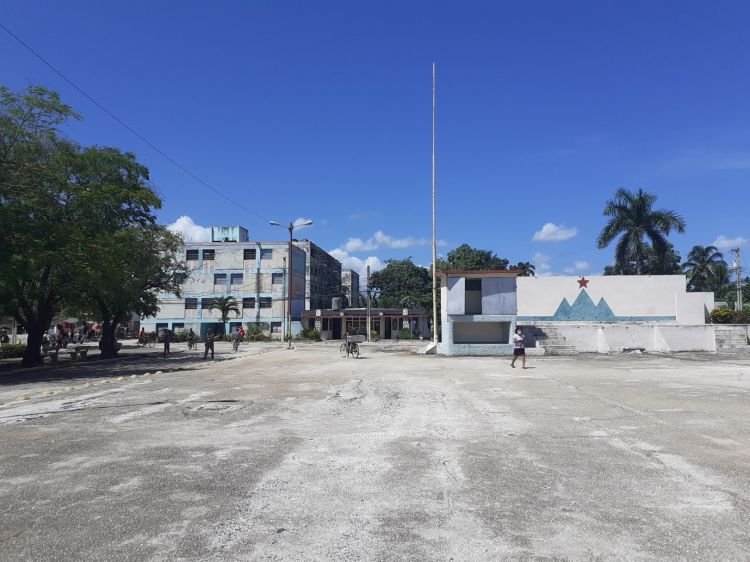Pump-priming Funding Part 1 Summary

Dr Anne Luke, Lecturer in Childhood Studies, University of Leeds, writes about her recent trip to Cuba to begin introductory work for a proposed project.
I was awarded pump-priming funding by the School of Education Research committee.
The aim was to consolidate links and establish links for the new proposed project, titled ‘Social education, arts and post-COVID recovery: comparative theatrical pedagogy as key to unleashing children's potential. A comparative participatory research project on arts education in Cuba and the United Kingdom at a community level.’
The Cuba Research Forum
I began the research trip in Havana where I participated in XXVI conference of the Cuba Research Forum, at Cuba’s leading cultural research institute, the Instituto Cubano de Investigación Cultural Juan Marinello.
As well as keynotes from leading Cuban intellectuals, I presented my perspective on the history of childhood which is central to the project in my paper, titled “Enfoques historiográficos alternativos a la Revolución Cubana: el valor y los desafíos de utilizar la niñez como unidad de análisis histórico”.
I met two of my co-investigators and cultural leaders to discuss Cuban perspectives on the project and the post-covid cultural landscape in Cuba. This understanding is crucial to the success of the project.
Contacting Cultural Groups
Following the conference, I travelled to the Granma province to contact cultural groups.
The importance of completing a risk assessment was brought home to me as we found ourselves travelling through severe flooding.
Cuba has a highly developed approach to disaster preparedness, as discussed in the 2021 book titled ‘Disaster Preparedness and Climate Change in Cuba’, edited by Emily Kirk, Isabel Story and Anna Clayfield and published at part of the Lexington Studies on Cuba book series.
One man sadly lost his life in the floods, and thousands had to be evacuated as rivers burst their banks and 360 mm of rain fell in 24 hours where we were based.
Despite the flooding, we continued our activities in Granma Province. We travelled to Bartolomé Masó, a small town in the foothills of the Sierra Maestra mountains, and Manzanillo and Bayamo, both larger municipalities in the province.
With co-investigator Professor Parvathi Kumaraswami, I met three children’s theatre groups in the province. They were keen to be part of the project, which will see a “twinning” between UK and Cuba children’s theatre groups.
We also met cultural leaders, librarians, teacher trainers and the lead for the youth cultural organisation Asociación Hermanos Saíz.
Cuba has a system of arts education based around the professional university-level training of arts instructors specialising in a specific field of study (theatre, dance, plastic arts and so on). They are integrated into Cuba’s cultural infrastructure.
Many theatre directors and actors, such as those I met, are also trained ‘instructores de arte’. Part of the project will examine the role of cultural infrastructure in practice for children’s artistic creation.
Spaces of Production and Materiality in Children’s Theatre
In Bayamo, we were able to attend a rehearsal of one children’s theatre group, including a full run-through of a comic Cuban version of Romeo and Juliet, which was performed with great skill and expertise, in the grounds of one of the city’s museums.
This led to reflections on spaces of production as well as questions on materiality and children’s theatre.
We were privileged to meet the children and their arts instructors, and we learned that the leaders of the theatre group had visited the local regions most affected by the floods to perform for the children who had been impacted by the devastation of the floods. This methodology is part of disaster preparedness referred to above.
Pump-priming Funding Next Steps
The second step of the pump-priming funding will involve bringing two directors of the Cuban participating theatre companies to Leeds.
They will meet local theatre groups and the rest of the project team, and hold a series of meetings to further develop the research questions, work packages and the methodology for the children to work together virtually across both countries.
This allows us to begin the project by co-creating our aims and objectives with our participants as far as possible, which aligns with our research values (ie prior to the initial application for funding being submitted).
Although there will be barriers to overcome for stage 2, we learned in stage 1 that the value of pump-priming funding is that it is allowing us to really get to the heart of what is possible and desirable.
This is not a “low hanging fruit” project, and sometimes (we believe) it is through following the road less travelled (with potentially more obstacles at first) that we can co-create something truly of value and that contributes in a new way towards decolonising our research.
Image
The page’s picture shows the library in Bartolomé Masó (low building in the centre of the picture) which is the cultural hub in this rural town.
There are weekly multi-agency meetings of cultural organisers in the library.
A couple of miles away in Caney (at the Ciudad Escolar), a new children’s theatre group based on the well-known La Colmenita group has been established which has been running for 8 months.




